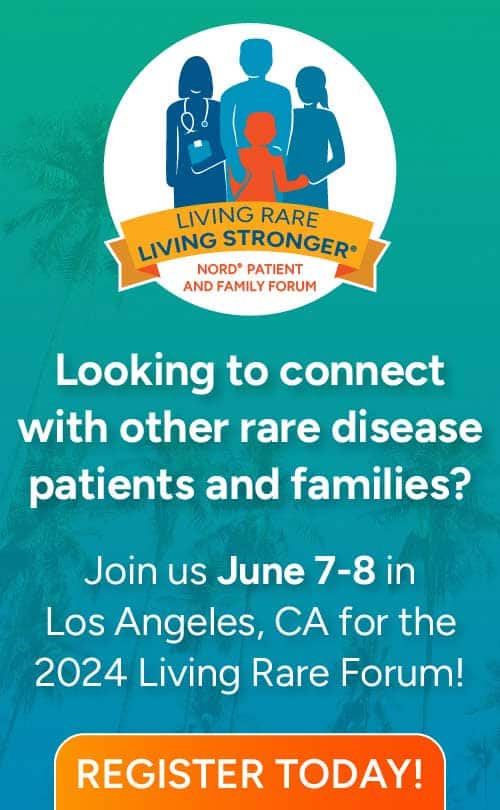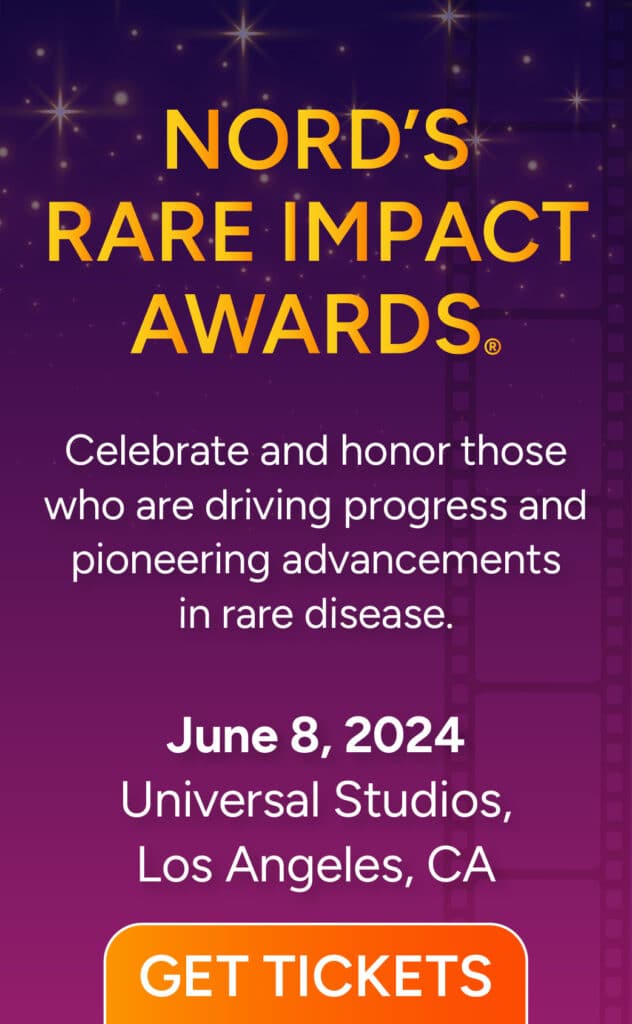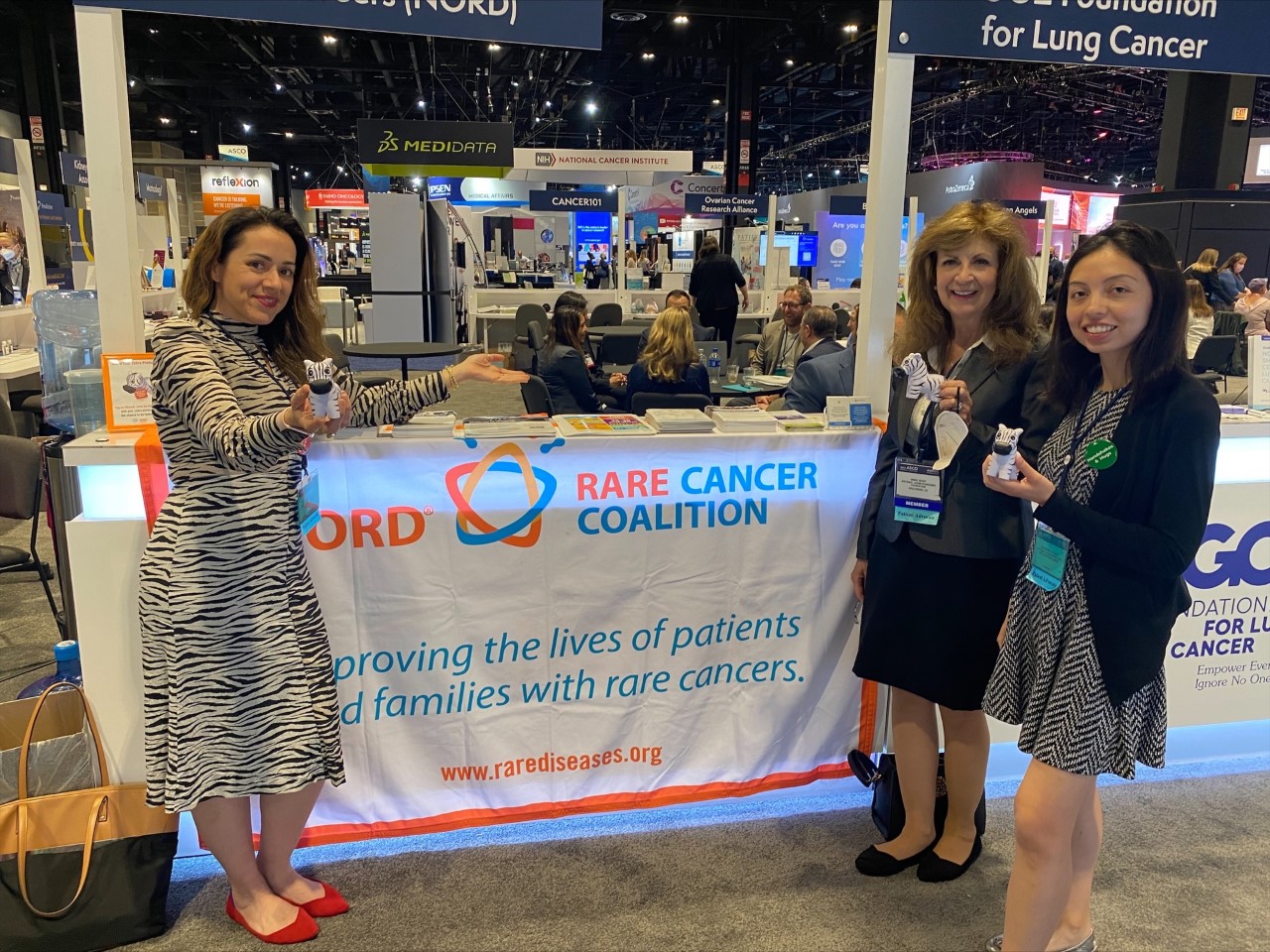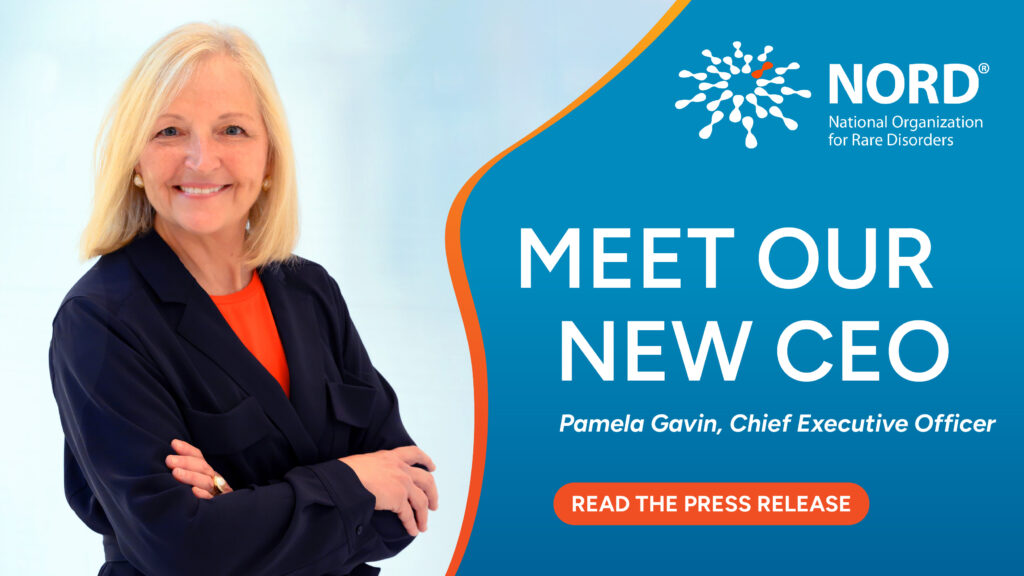Annie Achee is the President and Community Education/Research Liaison of the National Leiomyosarcoma Foundation (NLMSF). Leiomyosarcoma is a rare sarcoma (cancer) that originates in smooth tissue (including fat, muscle, nerves, tendons, and blood and lymph vessels) and can occur anywhere in the body. For more information, see the NORD Rare Disease Report on Leiomyosarcoma.
Annie is passionate about providing education about leiomyosarcoma to empower patients and families with knowledge and to build effective partnerships with other cancer organizations and research enterprises.
How did you get started in the rare disease community?
I began my work in the rare disease community and with the National Leiomyosarcoma Foundation (NLMSF) when my husband, Mitch Achee, was diagnosed with leiomyosarcoma in 2011. Mitch is a physician, radiologist, a 12-year leiomyosarcoma survivor, and serves on the NLMSF medical advisory board. We have been giving back to the leiomyosarcoma community through NLMSF since 2012.
How has your background and previous experiences given you the tools to lead the NLMSF today?
I was a former personnel officer for the Federal Highway Administration (FHWA) where I managed many programs for employees and managers. I created task forces and initiatives for Washington, DC and I was able to transfer my skillset to NLMSF in reconstructing the organization by creating regional, onsite patient programs throughout the US. I worked closely with the research community through the sarcoma centers of excellence to build agendas for NLMSF patient education programs. Additionally, I work with the research community to co-fund and fund research initiatives.
How does the NLMSF set itself apart from other related organizations?
NLMSF sets itself apart by always being on the cutting edge of strategizing what we anticipate patients might need, what the patient would like to know, and what kind of support they would like to have as well as their families. We are now working on educational resources like the “ABC’s of a New Diagnosis,” “Caregiving Counts for First Time Caregivers,” and launching a new program featuring patients’ perspectives participating in clinical trials.
No one has ever done a research roundtable for leiomyosarcoma, and we launched the International Leiomyosarcoma (LMS) Research Roundtable in 2019 where we were able to expand our network from 40 to 128 researchers dedicated to our sarcoma subtype. We try to reach all sarcoma patients, and for this goal, I co-founded the Sarcoma Coalition, which currently has 30 sarcoma foundation members. We also partnered with Sarcoma Patients EuroNet (now called the Sarcoma Patient Advocacy Global Network (SPAGN) to expand our work to a global platform.
How does the NLMSF include diversity and health equity principles in its initiatives?
We partner and collaborate with the Cynthia Solomon Holmes Foundation, a nonprofit organization that is in memory and honor of Cynthia Solomon Holmes, a 52-year-old African American woman who had leiomyosarcoma. The organization strives to represent the African American and underserved community affected by leiomyosarcoma.
Executive director of the Cynthia Solomon Holmes Foundation, Chandalyn Williams, is on the board of NLMSF and was a speaker for NORD’s “Grow and Diversify Your Board: When, Why and How” webinar. The Sarcoma Coalition membership voted Chandalyn Williams into the Sarcoma Coalition as a steering committee member to have her unique perspectives represented. The NLMSF reached out to for a collaborative opportunity to host a Black Families Cancer Week for leiomyosarcoma by partnering with the Cynthia Solomon Holmes Foundation and the Uterine Cancer Awareness Network. We discussed Cynthia Hayes’s book, The Big Ordeal which increases the conversation around emotion and cancer to over 100 cancer patients with different backgrounds, socioeconomic statuses, etc. who have various types of cancer.
How do you remain hopeful that rare disease/cancer/smooth tissue research and funding can continue to save more lives?
I remain hopeful knowing that the research community is so focused and dedicated to saving lives by advancing research. Researchers work tirelessly not only by seeing and treating patients but also by doing complicated research and supporting patient advocacy organizations. It is amazing that they find the time to do it all so graciously. Researchers are the champions of hope and heroes among us and to the patients. We can continue to go forward all together when our purpose is our passion and purpose meets progress.
In what ways does the NLMSF highlight and amplify the patient voice in its own and unique way?
NLMSF highlights and amplifies the patient voice through its many research organizations that we partner with, such as Sarcoma workgroups, affiliations with NORD and the Rare Cancer Coalition, ECOG-ACIRN, SARC, ICAN, and the FDA. Additionally, we hold multiple annual on-site patient education symposiums, share monthly virtual presentations with research community – including the Patient Caregiver Advocacy Roundtable – and host other critical events like the Survivors Inspire Peer Network or bi-quarterly LMS Live Research in Review -Connection Series, all to emphasize direct access to research projects that are in the pipeline that patients can be part of.
We have a Patient Perspectives page on our website. Implementing education programs that can benefit patients to be their best self-advocates is critical. We provide patients with the tools to make the best decisions regarding their care and treatment. When patients are done with treatment, they often walk away without resources and tools. Survivorship care planning is a critical resource the NLMSF provides, and if there isn’t a sarcoma center that can offer that to them, we want to make sure that we are educated enough to know that they need to create a survivorship care plan with their oncologist.
Are there any specific projects or initiatives in the past few years that you are particularly passionate about?
I am particularly passionate about the International LMS Research Roundtable. The roundtable brings together global researchers to discuss basic and translational science priorities in order to collaborate both within and outside the workgroups. Members of the roundtable are exclusively researchers because it is a scientific think tank that only meets yearly. We have five (5) working groups within the roundtables (LMS cell lines/ PDX models, gynecological, clinical trials assessment, proteomics/multiomics, and imaging strategies). Ultimately, the collaboration should lead to designing research projects that will advance clinical trials toward innovative treatment options.
Another initiative to highlight is the Broad Institute and MIT/Harvard project titled Cancer Cell Line Project for Leiomyosarcoma, which studies cell lines and RNA sequencing of tumors through the Rare Cancer Research Foundation (RCRF), a member of the Rare Cancer Coalition. The study looks at 10 cancers, including leiomyosarcoma.
A new project that we have collaborated on is the Leiomyosarcoma (LMS) Project within the COUNT ME IN PROJECT at the Broad Institute. The goal of the project is to partner with leiomyosarcoma patients in the US and Canada to study their cancer and generate a large genomic, clinical, molecular, and patient-reported information to be shared with the biomedical community in hopes of making data more available to accelerate discoveries. The project also aims to include groups that have been historically left out of research (I.e., rural and underrepresented patients) to increase the diversity of patients we partner with in an evidence-based way. We are grateful to Corrie Painter, PhD, for collaborating with us on this project for the sake of the LMS patient community.
What have you and Mitch Achee learned by attending large-scale annual meetings like ASCO? How does that help a small, rare disease nonprofit like NLMSF?
In addition to attending the American Society of Clinical Oncology (ASCO) annual meeting since 2012, which has over 40,000+ researchers, patient advocates, drug developers, and oncologists in attendance, we also attend the Connective Tissue Oncology Society annual meeting (CTOS) annually. CTOS highlights solid sarcoma research. From attending those meetings, we take the research updates back to the patients to advise them of what the latest and greatest research is. We take their voice and experiences to the table when we attend these meetings in the patient advocacy discussions. NLMSF’s membership participation includes the following organizations: AACR, CTOS, ASCO, ECOG-ACRIN, PCORI, FDA, and NORD.
What is a fun fact about you?
I have been married 44 years to Mitch and I am dedicated to his well-being. I am passionate about paying it forward to the patient community and am grateful for my husband’s survivorship.





